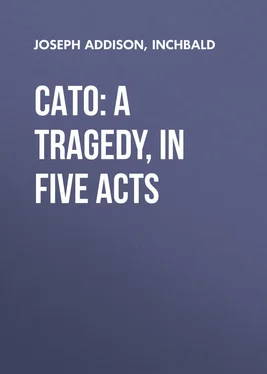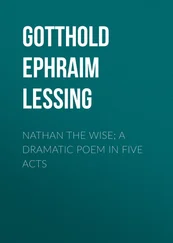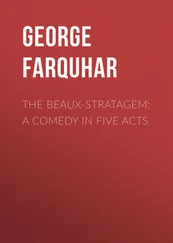Joseph Addison - Cato - A Tragedy, in Five Acts
Здесь есть возможность читать онлайн «Joseph Addison - Cato - A Tragedy, in Five Acts» — ознакомительный отрывок электронной книги совершенно бесплатно, а после прочтения отрывка купить полную версию. В некоторых случаях можно слушать аудио, скачать через торрент в формате fb2 и присутствует краткое содержание. Жанр: foreign_antique, foreign_prose, на английском языке. Описание произведения, (предисловие) а так же отзывы посетителей доступны на портале библиотеки ЛибКат.
- Название:Cato: A Tragedy, in Five Acts
- Автор:
- Жанр:
- Год:неизвестен
- ISBN:нет данных
- Рейтинг книги:4 / 5. Голосов: 1
-
Избранное:Добавить в избранное
- Отзывы:
-
Ваша оценка:
- 80
- 1
- 2
- 3
- 4
- 5
Cato: A Tragedy, in Five Acts: краткое содержание, описание и аннотация
Предлагаем к чтению аннотацию, описание, краткое содержание или предисловие (зависит от того, что написал сам автор книги «Cato: A Tragedy, in Five Acts»). Если вы не нашли необходимую информацию о книге — напишите в комментариях, мы постараемся отыскать её.
Cato: A Tragedy, in Five Acts — читать онлайн ознакомительный отрывок
Ниже представлен текст книги, разбитый по страницам. Система сохранения места последней прочитанной страницы, позволяет с удобством читать онлайн бесплатно книгу «Cato: A Tragedy, in Five Acts», без необходимости каждый раз заново искать на чём Вы остановились. Поставьте закладку, и сможете в любой момент перейти на страницу, на которой закончили чтение.
Интервал:
Закладка:
Joseph Addison
Cato: A Tragedy, in Five Acts
The author of this tragedy, to whose vigorous mind the English are indebted for their choicest moral works, came into the world with a frame so weak, that he was christened immediately on his birth, in consequence of the symptoms he gave of a speedy dissolution. The hand which reared him did a more than ordinary service to the age in which he lived, and to succeeding generations. Addison's pious writings, untainted by the rigour of superstition, have softened the harsh spirit of ancient religion, whilst they have confirmed all its principles.
He was the son of the Reverend Launcelot Addison, Rector of Milston, in the county of Wilts, at which place he was born, on the 6th of May, 1672.
After passing through some inferior schools, he was placed at the Charter-House; where he contracted that intimacy with Steele, which grew to a friendship honourable to them both, from its duration, and the instructions which their joint labour bestowed on mankind.
At the age of fifteen, young Addison was entered at Queen's College, Oxford, where he applied himself so closely to study, that, in a few years, his Latin poetry gained him high reputation in both universities, and, at the age of twenty-two, he became known to the nation at large by his English compositions.
He was now pressed by his father to take holy orders; which, notwithstanding his sedate turn of mind, and his habits of piety, he positively refused. Mr. Tickell has alleged, that it was Addison's extreme modesty, a constitutional timidity, which made him resolve against being in the church – but he became a statesman; and, surely, that is a character which requires as much courage as a clergyman's, when the church is not under persecution.
The first dramatic work from the pen of Addison, was an opera called "Rosamond," which having but indifferent success, he next assisted Steele in his play of "The Tender Husband;" for which the author surprised him by a dedication, openly to avow the obligation.
These two friends now united their efforts in that well-known periodical work, "The Spectator;" by which they reformed the manners, as well as the morals, of their readers, and established their own literary fame. But, as the talents of Addison were superior to those of Steele, so are the papers in this work which were written by him esteemed above the rest; – and, as a mark of distinction, he had the laudable, or his friend Steele the honest pride, to affix a letter at the end of every such paper, by which it should be known for his. The Muse Clio furnished the four letters which have been thus used in "The Spectator," as Addison's honourable stamp of authorship.
In the periodical work of "The Guardian" he had likewise some share; and, in 1713, he produced, what Dr. Johnson has called "the noblest work of Addison's genius" – "Cato."
Notwithstanding the merit of this play, it is certain that it was indebted to the political circumstances of the times, for that enthusiastic applause with which it was received by the town.
The joy or sorrow which an author is certain to experience upon every new production, is far more powerful in the heart of a dramatist than in that of any other writer. The sound of clamorous plaudits raises his spirits to a kind of ecstacy; whilst hisses and groans, from a dissatisfied audience, strike on the ear like a personal insult, avowing loud and public contempt for that in which he has been labouring to show his skill.
Addison, with his timid nature, felt all the excruciating tortures of an ambitious, yet a fearful dramatist. He could not stay at home on the first night of "Cato;" for to be told, at once, that his tragedy was driven from the stage with derision, had been to his tremulous nerves like the dart of death. Not less peril might have befallen him as an auditor – he therefore was neither present on the first performance, nor absent from the theatre; – but, placing himself on a bench in the green-room, his body motionless, his soul in tumult, he kept by his side a friend, whom he dispatched every minute towards the stage, to bring him news of what was passing there. He thus secured, he conceived, progressive information of his fate, without the risk of hearing it from an enraged multitude. But such was the vehemence of applause, that shouts of admiration forced their way through the walls of the green-room, before his messenger could return with the gladsome tidings. Yet, not till the last sentence was spoken, and the curtain fairly dropped upon Cato and his weeping friends, did the author venture to move from the inanimate position in which he was fixed. This acute dread of failure now heightened the joy of success, and never was success more complete.
"Cato," says Pope, in a letter to one of his friends, written at the time, "was not so much the wonder of Rome in his days, as he is of Britain in ours."
The most fortunate of all occurrences took place, from the skill with which Addison drew this illustrious Roman – he gave him so much virtue, that both Whigs and Tories declared him of their party; and instead of any one, on either side, opposing his sentences in the cause of freedom, all strove which should the most honour him.
Both auditors and readers, since that noted period, much as they may praise this tragedy, complain that it wants the very first requisite of a dramatic work – power to affect the passions. This criticism shows, to the full extent, how men were impassioned, at that time, by their political sentiments. They brought their passions with them to the playhouse, fired on the subject of the play; and all the poet had to do was to extend the flame.
It is a charge against this drama, that the love scenes are all insipid; but it should be considered, that neither Cato nor his family, with strict propriety, could love any thing but their country. – As this is a love which women feel in a much less degree than men, and as bondage, not liberty, is woman's wish, "Cato," with all his patriotism, must ever be a dull entertainment to the female sex; and men of course receive but little pleasure from elegant amusements, of which women do not partake.
The language and sentiments contained here are worthy of the great Addison and the great Cato; and if, as it is objected, the characters are too elevated to be natural, yet they accord with that idea of nature which imagination conceives of such remarkable personages.
The author of "Cato" had planned other tragedies and celebrated works, which the subsequent part of his days did not give him leisure to execute; for, on the death of Queen Anne, the Lords Justices made him their Secretary: he was soon after appointed principal Secretary of State. These, and other public employments, prevented his completing farther literary designs. Or, it may be thought, that the loss of his domestic tranquillity, at this time, by his marriage with the Countess Dowager of Warwick, might possibly impede every future attempt for the favour of the Muses, to whom this, his wife, had not the slightest affinity. It is supposed she embittered, by arrogance and discontent, the remainder of this good man's life, which terminated on the 17th of June, 1719, in the 47th year of his age. He died at Holland House, near Kensington, and left an only child, a daughter, by the Countess.
Lady Warwick had also a son by her former husband, a very fine, spirited, and accomplished youth, for whose welfare the dying Addison showed peculiar concern; for, in the extremity of his disorder, having dismissed his physicians, and with them all hopes of recovery, he desired that the young Lord Warwick might be called to his bedside. He came – but life was now fast departing from his revered father-in-law, and he uttered not a word. After an afflicting pause, the young man said, "Dear sir, you sent for me; I believe, and I hope, that you have some commands; I shall hold them most sacred." Grasping his hand, Addison softly replied, "I sent for you, that you might see in what peace a Christian can die." He spoke with difficulty, and instantly expired.
Читать дальшеИнтервал:
Закладка:
Похожие книги на «Cato: A Tragedy, in Five Acts»
Представляем Вашему вниманию похожие книги на «Cato: A Tragedy, in Five Acts» списком для выбора. Мы отобрали схожую по названию и смыслу литературу в надежде предоставить читателям больше вариантов отыскать новые, интересные, ещё непрочитанные произведения.
Обсуждение, отзывы о книге «Cato: A Tragedy, in Five Acts» и просто собственные мнения читателей. Оставьте ваши комментарии, напишите, что Вы думаете о произведении, его смысле или главных героях. Укажите что конкретно понравилось, а что нет, и почему Вы так считаете.












